Tìm x:
9x2 +4=12x
Hãy nhập câu hỏi của bạn vào đây, nếu là tài khoản VIP, bạn sẽ được ưu tiên trả lời.


a: 49x^2-25=0
=>(7x-5)(7x+5)=0
=>7x-5=0 hoặc 7x+5=0
=>x=5/7 hoặc x=-5/7
b: Đề thiếu vế phải rồi bạn
c: (3x-2)^2-9(x+4)(x-4)=2
=>9x^2-12x+4-9(x^2-16)=2
=>9x^2-12x+4-9x^2+144=2
=>-12x+148=2
=>-12x=-146
=>x=146/12=73/6
d: x^3-6x^2+12x-8=0
=>(x-2)^3=0
=>x-2=0
=>x=2
e: x^3-9x^2+27x-27=0
=>(x-3)^3=0
=>x-3=0
=>x=3
a) \(-25+49x^2=0\)
\(\Leftrightarrow49x^2-25=0\)
\(\Leftrightarrow\left(7x\right)^2-5^2=0\)
\(\Leftrightarrow\left(7x-5\right)\left(7x+5\right)=0\)
\(\Leftrightarrow\left[{}\begin{matrix}7x-5=0\\7x+5=0\end{matrix}\right.\)
\(\Leftrightarrow\left[{}\begin{matrix}7x=5\\7x=-5\end{matrix}\right.\)
\(\Leftrightarrow\left[{}\begin{matrix}x=\dfrac{5}{7}\\x=-\dfrac{5}{7}\end{matrix}\right.\)
b) \(16x^2-25\left(x-2\right)^2=0\)
\(\Leftrightarrow\left(4x\right)^2-\left[5\left(x-2\right)\right]^2=0\)
\(\Leftrightarrow\left(4x-5x+10\right)\left(4x+5x-10\right)=0\)
\(\Leftrightarrow\left(10-x\right)\left(9x-10\right)=0\)
\(\Leftrightarrow\left[{}\begin{matrix}10-x=0\\9x=10\end{matrix}\right.\)
\(\Leftrightarrow\left[{}\begin{matrix}x=10\\x=\dfrac{10}{9}\end{matrix}\right.\)
c) \(\left(3x-2\right)^2-9\left(x+4\right)\left(x+4\right)=2\)
\(\Leftrightarrow9x^2-12x+4-9\left(x^2+8x+16\right)=2\)
\(\Leftrightarrow9x^2-12x+4-9x^2-72x-144=2\)
\(\Leftrightarrow-84x-140=2\)
\(\Leftrightarrow-84x=142\)
\(\Leftrightarrow x=-\dfrac{142}{84}\)
\(\Leftrightarrow x=-\dfrac{71}{42}\)
d) \(x^3-6x^2+12x-8=0\)
\(\Leftrightarrow x^3-3\cdot2\cdot x^2+3\cdot2^2\cdot x-2^3=0\)
\(\Leftrightarrow\left(x-2\right)^3=0\)
\(\Leftrightarrow x-2=0\)
\(\Leftrightarrow x=2\)
e) \(-27+27x-9x^2+x^3=0\)
\(\Leftrightarrow x^3-9x^2+27x-27=0\)
\(\Leftrightarrow\left(x-3\right)^3=0\)
\(\Leftrightarrow x-3=0\)
\(\Leftrightarrow x=3\)

\(a,\Leftrightarrow4x^2+4x+1-4x^2-12x=9\\ \Leftrightarrow-8x=8\Leftrightarrow x=-1\\ b,\Leftrightarrow\left(x-6\right)^2=0\Leftrightarrow x=6\)

1)
a) \(=15x^3-20x^2+10x\)
b) \(=3x^4-x^3+4x^2-9x^3+3x-12x=3x^4-10x^3+4x^2-9x\)
2)
a) \(\Rightarrow x\left(x^2-6x+12\right)=0\)
\(\Rightarrow x=0\)(do \(x^2-6x+12=\left(x^2-6x+\dfrac{36}{4}\right)+3=\left(x-\dfrac{6}{2}\right)^2+3\ge3>0\))
b) \(\Rightarrow\left(x+3\right)^3=0\Rightarrow x=-3\)
(3x²-5x+2)+(3x²+5x)= bao nhiêu ạ
Giúp em vs ạ . Em cảm ơn

(a) \(9x^2+12x+4=0\)
\(\Leftrightarrow\left(3x+2\right)^2=0\Leftrightarrow3x+2=0\Leftrightarrow x=-\dfrac{3}{2}\)
(b) \(x^2+\dfrac{1}{4}=x\)
\(\Leftrightarrow x^2-x+\dfrac{1}{4}=0\Leftrightarrow\left(x-\dfrac{1}{2}\right)^2=0\Leftrightarrow x-\dfrac{1}{2}=0\Leftrightarrow x=\dfrac{1}{2}\)
(c) \(4-\dfrac{12}{x}+\dfrac{9}{x^2}=0\left(x\ne0\right)\)
\(\Leftrightarrow\left(2-\dfrac{3}{x}\right)^2=0\Leftrightarrow2-\dfrac{3}{x}=0\Leftrightarrow x=\dfrac{3}{2}\)

\(a,=x^2-8x+16+1=\left(x-4\right)^2+1\ge1\)
Dấu \("="\Leftrightarrow x=4\)
\(b,=\left(4x^2-12x+9\right)+4=\left(2x-3\right)^2+4\ge4\)
Dấu \("="\Leftrightarrow x=\dfrac{3}{2}\)
\(c,=\left(9x^2-2\cdot3\cdot\dfrac{1}{3}x+\dfrac{1}{9}\right)+\dfrac{26}{9}=\left(3x-\dfrac{1}{3}\right)^2+\dfrac{26}{9}\ge\dfrac{26}{9}\)
Dấu \("="\Leftrightarrow3x=\dfrac{1}{3}\Leftrightarrow x=\dfrac{1}{9}\)

+Trước tiên từ đồ thị hàm số y= 2x3- 9x2+12x , ta suy ra đồ thị hàm số y= 2 x 3 - 9 x 2 + 12 x như hình dưới đây:
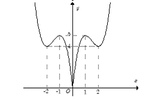
+ Phương trình 2 x 3 - 9 x 2 + 12 x + m = 0 và đường thẳng y= -m
+ Dựa vào đồ thị hàm số y = 2 x 3 - 9 x 2 + 12 x , yêu cầu bài toán trở thành:
4< -m< 5 hay -5<m< -4.
Chọn B.

Đặt y = 2 x 3 - 9 x 2 + 12 x - 4
Ta có f x = f x , x ≥ 0 f - x , x < 0 .
Do f x là hàm số chẵn nên đồ thị đối xứng qua trục tung. Như vậy đồ thị của nó gồm hai
Phần bên phải trục tung của đồ thị hàm số y = f(x)
Đối xứng phần đồ thị trên qua trục tung
Ta có: 2 x 3 - 9 x 2 + 12 x = m
⇔ 2 x 3 - 9 x 2 + 12 x - 4 = m - 4
Phương trình đã cho có 6 nghiệm phân biệt.
Đường thẳng y = m - 4 cắt đồ thị f x hàm số tại 6 điểm phân biệt
0 < m - 4 < 1 nên 4 < m < 5
Đáp án B
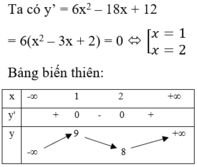
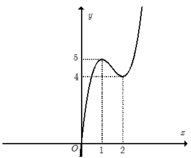

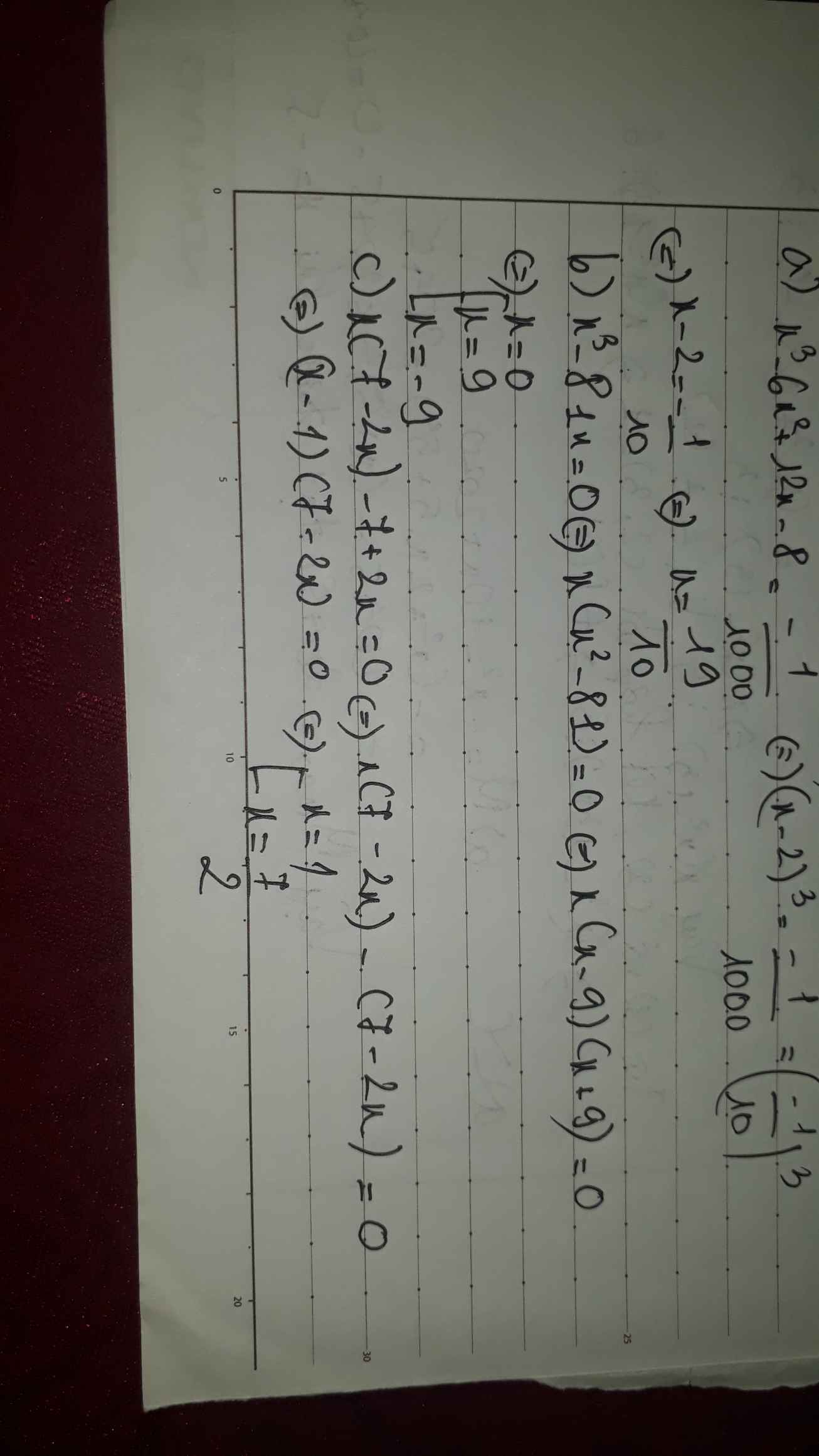
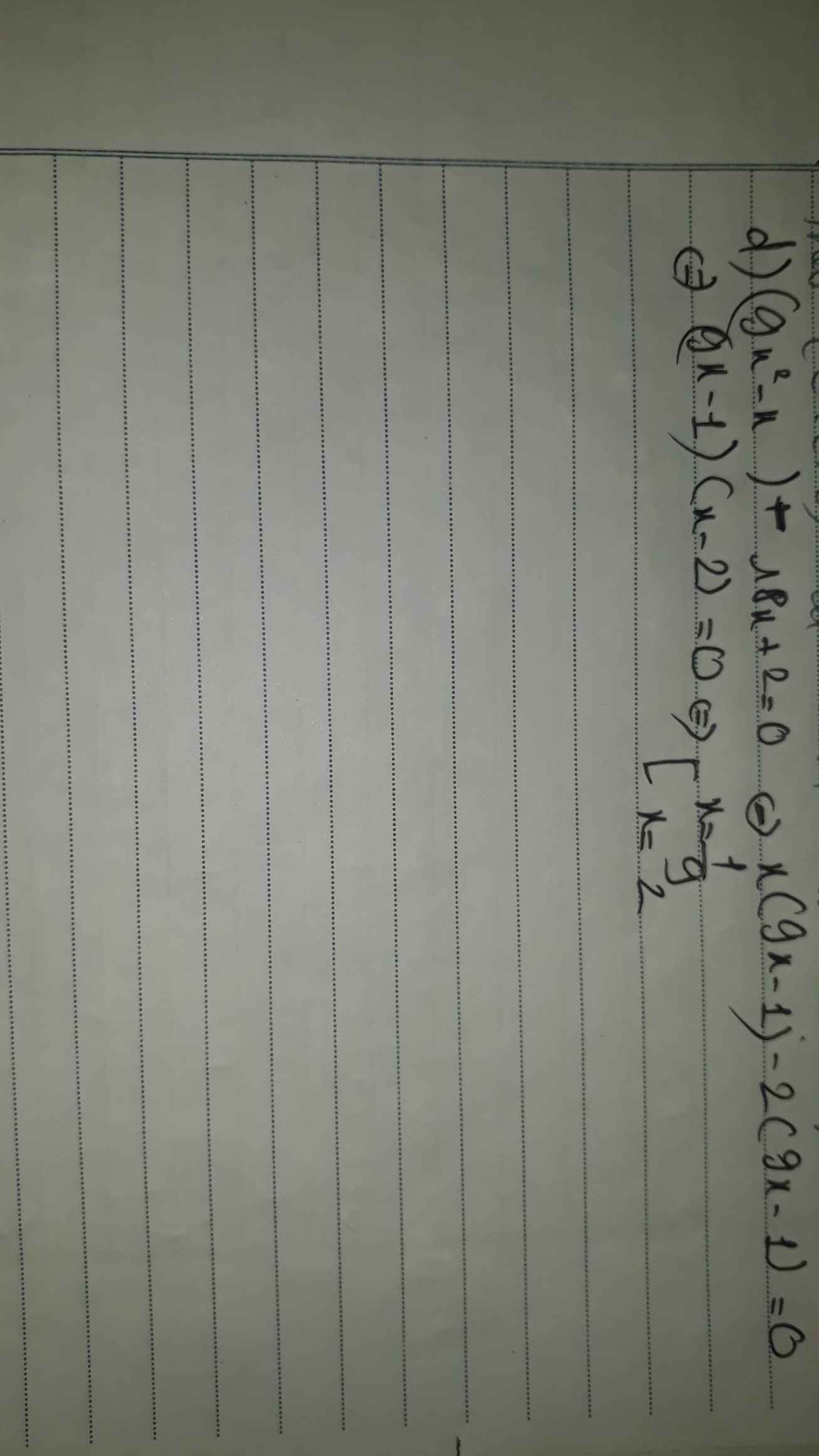
<=>(3x)2-12x+4=0
<=>(3x-2)2=0
<=> 3x-2=0
<=>3x=2
<=>x=2/3
\(9x^2+4=12x\)
=> \(9x^2-12x+4=0\)
=>\(\left(3x\right)^2-2.3.2.x+2^2=0\)
=> \(\left(3x-2\right)^2=0\)
=> \(3x-2=0\)
=> \(x=\frac{2}{3}\)